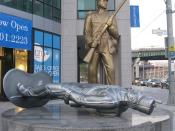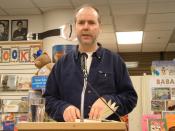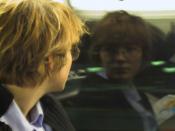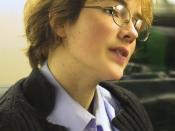When our lives take a turn in the opposite direction from the sturdy, straight path we are accustomed to, it is because there is some kind of nagging force present in our lives, either internally or externally, which is beyond our control. It is only when we cannot cope with these internal and external aspects of our existence that we tend to give up all hope for our lives to improve, and resort to merely putting up with the pathetic lives we lead. The characters in the novels Miss Wyoming by Douglas Coupland and Courage My Love by Sarah Dearing, Susan Colgate and Nova Philip, experience this loss of hope, and both find themselves taking spiritual journeys with the hopes of finding what truly makes them happy, aspiring to improve their outlook on life. When the internal and external aspects of the lives of Susan and Nova are examined, it is evident that Coupland and Dearing have created characters that are very much alike.
One of the most influential factors on a person's outlook on life is his or her self-esteem, an important internal aspect of everyone's lives. In both Miss Wyoming and Courage My Love the reader is introduced to a protagonist who has extremely low self-esteem and is miserable on account of it. The driving force behind Susan's shattered self-image is from her over-bearing mother, Marilyn, who forced her into competing in beauty pageants at the tender age of six. Within the beauty pageant scene, Susan won a few trophies and lost a few titles, and it was those moments of defeat when her mother felt the need to put her down.
Oh my, a runner-upâ¦I have a daughter, yes, but she's a winner, and you couldn't possibly be her because your sash says FIRST RUNNER-UP, which means the same thing as losing (Coupland 34).
Comments as such were what ultimately caused Susan to think so poorly of herself, especially when they were being spoken by her own mother. As for Nova Philip, her self-esteem issues were derived mostly from her lifeless marriage with her husband, Brendan Donahue. Living with a man who spent most of his time at his office, who insulted her, who blamed his problems on her, and who showed very little respect for her, was obviously a major factor in the plummeting of Nova's positive outlook on life. Even a romantic, spontaneous attempt to save the marriage on Nova's part was quickly discouraged when Brendan blatantly told her she was "acting like a whore" and that she "disgust[ed] him" (Dearing 55). Both Susan and Nova obviously felt they were worthless people, and, because of their low self-esteem, there was very little motivation to improve their present lives. As there was nothing holding them back, they took the plunge and started their lives over again on fresh, clean slates, their first step towards spiritual healing.
As a result of low self-esteem, many people begin to feel as though they no longer want to go on living the life they have come to know, and that they need some sort of escape from the people and places that cause them to feel so low. In the cases of Susan Colgate and Nova Philip, they not only experience this sentiment, they end up carrying out actions that create a whole new identity for their characters. After a serious plane crash, instead of picking up the pieces and going home, Susan decides to disappear from the public eye and go along with the public assumption that she died in the crash along with all the other passengers, therefore giving her an anonymous identity. Susan's spontaneous spiritual journey, which entails her new life of uncertainty, is inspired by the fact that she "no longer gives a rat's ass" (Coupland 187) about what people think of her, or about the so-called glamour of Hollywood. Even though people pegged her to be "as crazy as a fucking loon" (Coupland 140) for running away from her fame and her fortunes, she ended up being much happier when all was said and done. Nova Philip experienced the desire to change her identity under extremely sudden and bizarre circumstances: the intestines of a shark in a market booth told her to leave home.
The entrails gurgled for a moment and spoke to her. In a surprisingly clear and ordinary male voice, they told her: "Leave your husband. Leave him now." (Dearing 1) Unlike Susan, she was not entirely convinced, at first, that abandoning her marriage and the comfort of her lifestyle would be the best thing for her to do. However, after contemplating her need to "escape before [she] became too much the wife", as she felt she was "too young for that" (Dearing 6), she persuaded herself to believe that leaving Brendan was the right decision. It does not become evident that Nova is entirely comfortable with her new free-spirited identity until the end of the novel, but the reader can sense her happiness as she compares her old self to her new self.
They hand me the passport, and I look at the picture of a young woman with dead green eyes.
"You're Mrs. Philippa Donahue?" "I'm Phillie," I say. "I live above a store called Asylum, in Kensington Market." (Dearing 196) While their journeys take them in slightly different directions, and include a wide variety of inspiring characters along the way, both Susan and Nova experience the satisfaction of adopting a healthier, happier identity.
One of the external factors of our lives that tends to influence us in many ways is the relationships we form with the people in our worlds. For both Susan and Nova, two young women with histories of verbally abusive, controlling relationships, their new identities allow them to reinstate their faith in human beings. After the plane crash, Susan finds a letter from a devoted fan, Randy Montarelli, who describes her as "a kind of yardstick in [his] life" (Coupland 75). As the story progresses, Susan finds herself seeking help from Randy when she is about to give birth to her son, Eugene Junior. Randy ends up devoting about two years of his life to caring for Susan and her baby. Nova was also fortunate enough to have found someone willing to look out for her in her time of uncertainty. In Kensington Market, which is reminiscent of "downtown America, the place to avoid after dark" (Dearing 140), she befriends the street-wise artist Tommy Gunn. From the moment they met, Tommy made it clear that he was going to be there for Nova when he warned that "there's things [she] should know [about Kensington] before [she] step(s) out for an evening stroll" (Dearing 8). During the time they spend together, Tommy teaches her to take time to examine the expressions on people's faces, to "wonder what joy or pain is in their eyes, their lives" (Dearing 20). This lesson is what ultimately allowed Nova to immerse herself in the Kensington way of living. Tommy took the time to "point [Nova] in a few right directions" (Dearing 20), and because of this, her faith in people was restored. Susan and Nova were blessed to have had such wonderful people wander into their lives in the midst of such trying times, and were equally blessed that these genuine people were what initially enabled them to start seeing the good in everyone once again.
After careful analysis of the protagonists Susan Colgate and Nova Philip, created by Douglas Coupland and Sarah Dearing, it is clearly the internal and external aspects of their lives are what make them so easy to parallel. Both Susan and Nova struggled with self-esteem issues caused by verbally abusive relationships, traded their real lives in for new identities on a quest to do some soul searching, and, as a result of their new identities and lifestyles successfully reinstated their faith in the human race. With the idea in mind that two completely different authors created these two strikingly similar characters, one cannot help but wonder if there is a common message to be found within these books. Both Coupland and Dearing seem to be suggesting that if people simply take the time to stop feeling sorry for themselves, venture out into a place that they know little about, and attempt to see strangers as real people, perhaps they may all feel a little better about their lives. If every person on this planet took the time to take a spiritual journey as such, we would likely find ourselves living in greater harmony with each other than ever before.
Works Cited Coupland, Douglas. Miss Wyoming. Toronto: Vintage Canada, 1999.
Dearing, Sarah. Courage My Love. Toronto: Stoddart Publishing Co. Limited, 2001.





